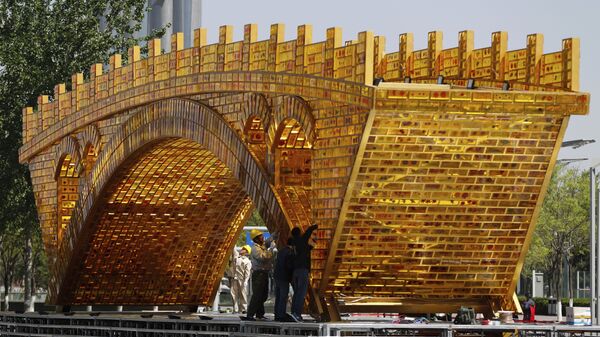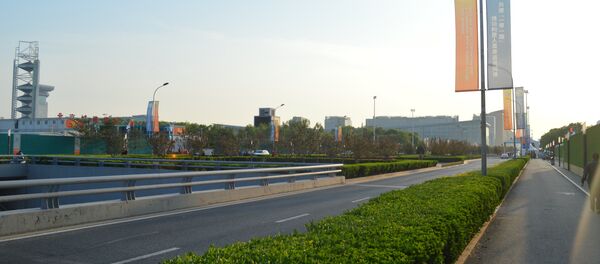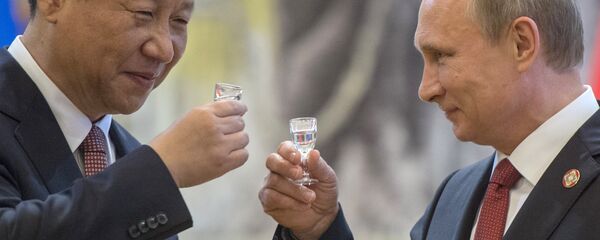New Delhi (Sputnik): China's outreach continues to be viewed sceptically by several pundits, who believe the former is seeking to expand its geopolitical influence at other countries' expense. The communiqué issued after the second BRF pledged to pursue people-centred and sustainable development in line with China's national interests, as well as its international obligations.
India, for the second time, skipped the event in protest against the China-Pakistan Economic Corridor (CPEC), a key component of the Belt and Road that passes through the Pakistani side of Kashmir — which is claimed by India. The corridor connects the Chinese city of Kashgar with Pakistan's Gwadar port on the Arabian Sea.
A portion of Indian scholars focusing on China believe that India can't consider joining the BRI due to the issue of sovereignty.
Beijing's recent moves to address criticism of its ambitiously conceived multi-billion dollar BRI are nothing but the proverbial "old wine in a new bottle", said an Indian scholar on China.
READ MORE: Nepal PM Vows to Improve Ties With China, Eases Fears of BRI Debt Trap
In an interaction with Sputnik, Professor Sujit Dutta, distinguished fellow and editor (National Security) at the Vivekananda International Foundation, a Delhi-based think tank, opined that China's appeal for enhanced global connectivity is unworkable and will come unstuck in the long-run.
Analysing China's reported willingness to take a fresh look at some of the BRI's drawbacks after deliberations at the recently held second forum of the initiative and its desire to change approach for promoting greater global connectivity, Professor Dutta said: "Most of the projects and programmes initiated so far have been done with the expressed aim of advancing Chinese economic, geopolitical, and strategic interests.
READ MORE: Enhanced India-ASEAN Collaboration an Attempt to Checkmate China — Diplomat
"The infrastructure and power sectors are the key areas for China. There is a huge demand for both in developing countries, as well as in least developing countries, which don't have finances of their own to do it themselves".
"The moment they (China) made the CPEC (China-Pakistan Economic Corridor) a part of the BRI, it became impossible for India to be a part of that because her sovereignty had been violated. You cannot compromise with sovereignty because of BRI you understand… these projects are Chinese projects, they are not participatory projects. CPEC — China is spending so much money, why? Because it wants to connect its Xinjiang province with the Arabian Sea", he said.
China is also promoting its Maritime Silk Route (MSR) initiative as a proposed oceanic complement to its various overland "Silk Route" projects, which, if successful, could bind countries in the Bay of Bengal and the northern Indian Ocean much closer to its economy.
"Do the countries taking help or assistance from China for any of their projects have the capacity to pay back — the answer is no. So when you can't pay back, the Chinese take over the project. Look at Gwadar in Pakistan, leased for 40 years to China; Hambantota in Sri Lanka, 99 years".
READ MORE: Italy Tries to Catch Up With EU Partners by Joining Belt and Road — Analysts
"The principal aim of these projects is focused on infrastructure and power, not only to open up markets and corridors for China, but also to export China's huge building capacities in sectors such as power, steel, and cement, besides other areas".
"We must understand that domestic demand in China is on the decline and the country's companies are already in overcapacity mode. It's a case of transferring their surpluses and losses to the lesser developed countries who need them", Professor Dutta told Sputnik.
"India and China have been having talks and talks since 1991; let me go back, the first talks took place in 1981. Look at the Boundary Question, China has not moved an inch on the Boundary Question; look at the Masood Azhar issue, no movement. Issue after issue, as far as India is concerned, is frozen. There can be as many summits as they want, what are the outcomes? That's important".
READ MORE: Chinese Foreign Ministry Says Not Expecting US Officials at Belt And Road Forum
The BRI is President Xi's signature global infrastructure policy. First announced in 2013, the mega project aims to build ports, roads, and railways to revive the ancient Silk Road and create new trade corridors linking China to Asia, Africa, and Europe.
The views expressed in this article are those of the speaker and do not necessarily reflect those of Sputnik.





